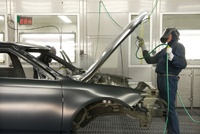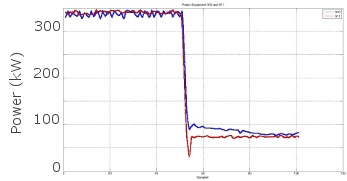Datahub Case Study: Saab Automobile - Sweden
Energy Efficiency Research Facilitated by the Cogent DataHub
In Trollhättan, Sweden, the country's largest vehicle manufacturers are collaborating with two universities to decrease energy consumption in their paint shops. The Energy Efficient Paint Shop project, managed by Saab Automobile, has a goal of finding the optimal air flow in the automotive painting process, to maximize cost savings and reduce environmental impact. Partners in the project include Volvo Cars, AB Volvo, Scania, Pininfarina, University West, Linköping University, Vinnova, Midroc Europe, and Innovatum Technology Park.
 “Automotive paint shops use by far the most energy in vehicle manufacturing, accounting for about 70% of the total factory energy demand,” said Mr. Mattias Ottosson, R&D Engineer at University West, Trollhättan, the project spokesperson. “The ovens and paint booths consume the most energy because of the huge amount of air that is constantly vented, heated, and filtered, regardless of whether car bodies are actually being painted. The goal of this project is a 25% reduction in energy consumption by 110331_SaabPaintingcontinuously adjusting the amount of processed air, based on the number of vehicles that are currently being painted, without sacrificing final product quality.”
“Automotive paint shops use by far the most energy in vehicle manufacturing, accounting for about 70% of the total factory energy demand,” said Mr. Mattias Ottosson, R&D Engineer at University West, Trollhättan, the project spokesperson. “The ovens and paint booths consume the most energy because of the huge amount of air that is constantly vented, heated, and filtered, regardless of whether car bodies are actually being painted. The goal of this project is a 25% reduction in energy consumption by 110331_SaabPaintingcontinuously adjusting the amount of processed air, based on the number of vehicles that are currently being painted, without sacrificing final product quality.”
In the Saab Automobile paint shop, all fan motors, air and water recycling valves, and ovens are connected in a single production system. An ABB AC800M PLC is used to collect data from the production system, as well as track the progress of incoming and completed car bodies. The PLC controls the valves and motors for optimal recycling of air and water, based on the positions of the car bodies in the paint shop. It sends measurement and control values to an OPC server installed in a data acquisition computer. Also on that computer, the Cogent DataHub collects data from the OPC server and stores it in a MySQL database.
 “The Cogent DataHub has proven to be a useful tool right from the start,” said Mr. Ottosson. “It was easy to set up and connect to both the OPC Server and the MySQL database. We can easily change which parameters and data to save, which is very important in a project like this.”
“The Cogent DataHub has proven to be a useful tool right from the start,” said Mr. Ottosson. “It was easy to set up and connect to both the OPC Server and the MySQL database. We can easily change which parameters and data to save, which is very important in a project like this.”
Once the necessary hardware was in place, the team needed to choose a way to monitor and control the loom, Cogent DataHub® seems like the ideal solution. Connecting the Cogent DataHub to the iba System OPC server, Dr. Gloy and his team were able to use DataHub WebView™ to quickly build a web HMI.
The data in the MySQL database is used for real-time monitoring of the energy consumption and for further analysis in Matlab and Excel. The data is also used by Linköping University to create an air flow model of the paint shop. The air flow model will be used to create an MPC (Model Predictive Control) controller in the PLC. The current goal is to collect data for a number of months and then to design the appropriate controller, which will be implemented later this year. Until then, the PLC will use a simple on-off-control strategy.
 "Things are looking promising and will be even better when the MPC-controller has been implemented,” said Mr. Ottosson. “We would like to thank Cogent for their support and continuous feedback on this project. The collaboration has been really beneficial. The stability of the Cogent DataHub, together with its flexibility ensures that we will use it again in future projects, and also recommend it to others.”
"Things are looking promising and will be even better when the MPC-controller has been implemented,” said Mr. Ottosson. “We would like to thank Cogent for their support and continuous feedback on this project. The collaboration has been really beneficial. The stability of the Cogent DataHub, together with its flexibility ensures that we will use it again in future projects, and also recommend it to others.”
OPC DataHub is a trademark of Cogent Real Time Systems. Software Toolbox is a trademark of Software Toolbox, Inc.
Try It Yourself - How-To Video and DataHub Free Trial
STAY CONNECTED
1-888-665-3678 (US + Canada)
+1-704-849-2773 (Global)
+1-704-849-6388 (Fax)
support.softwaretoolbox.com
WORKING WITH US
WHO WE ARE
RECENT POSTS
Usage subject to our website terms and conditions.


